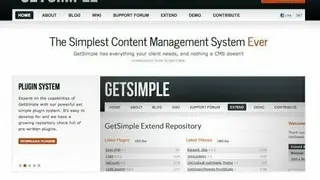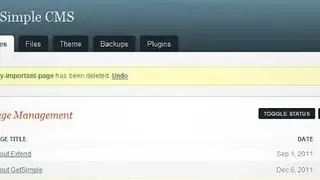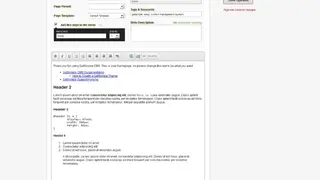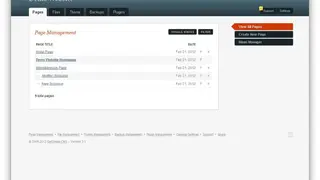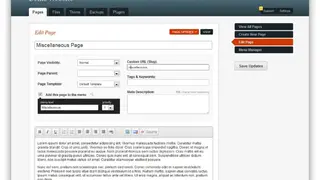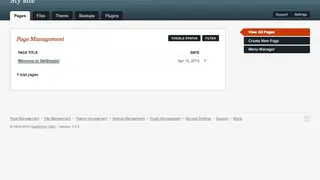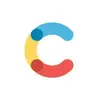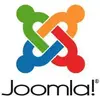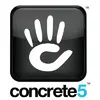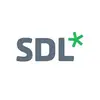
GetSimple CMS
GetSimple CMS is a free, flat, and extensible web CMS. It is written in PHP and deploys the XML file to store the web content. It is different from those CMSs that utilize the MySQL databases. Simple installation and setup, user-friendly interface & control, documentation, feature-rich support for multi-user, and the highly advanced security system make it one of the best content management systems.
At first, it was able to support smaller websites only, but now it is efficient in dealing with large-scale enterprises’ websites. The best about GetSimple CMS is that it supports installing the extra themes and plugins that extend its features and functions and make it more productive for carrying any task regarding web content management.
GetSimple CMS Alternatives
#1 Stacey
Stacey is a content management system for managing all types of content of any website. It requires no kind database setup or installation of a file that makes the Stacey one of the best lightweights yet powerful content management system. The process of working with Stacey simply starts by dropping the apps in a server, and then it will automatically begin to run. Among a lot of features and functions, Stacey provides its users with the system of creating the folders to manage the content and editing the text files as well.
There are no formalities about admin interface and login screens; the users can instantly start working via Stacey. To use the Stacey, the users are required to PHP 5+ on the server. The users can also install the htaccess file support and Apache with mod-rewrite as well, but both of these optional choices. It is one of the best CMS that offers the users complete control over their online content management.
#2 WordPress
WordPress is among the leading content management systems in the world that, in addition to providing the platform for publishing and website maintenance tools, deals in creating blogs and websites. This content management system delivers the webmasters and bloggers with all those tools and functions that help them manage all of their online content from editing to publishing.
WordPress itself is based on MySQL and PHP and is basically installed on a web server. Today, it is one of the most popular and widely used content management systems because of offering plenty of options to its users. It has its own web template system that utilizes the template processor.
Moreover, it is much featured rich in themes, plugins, integration systems for mobile applications, and many other features. Those features are available in the shape of search engine optimization tools, search engine friendly system, clean permalink structure system, support for tagging, and almost all those features and functions that are regarded as must-have elements for a powerful online presence.
#3 Contentful
Contentful is one of the best CMSs because of being based on the API; rather than merely focusing on the browser. It is different from other leading CMSs in various aspects, like it has a system for the scalable cloud where no setup is required and content-centric instead of being page-centric. It delivers the best content as per the demand of its users.
The best thing about this tool is that it delivers web admins and web developers with a customization system to structure and organize their content according to their own requirements. It even lets its users create their own custom content model rather than using predefined and fixed templates. These features collectively make it one of the best content management systems in the online world. Users are no longer required to deal directly with the raw API as SDKs for most languages have already been created by Contentful.
#4 Drupal
Drupal is an open-source CMS that delivers the solution for documentation, the source for download, and provides some hosting solutions. It is a fine selection of almost two hundred plus improvements and features that let the users manage online content and prioritize tasks according to the individuals. It is the best tool for the availability of modules, security system, themes, developer docs system, API docs, and distro.
Drupal is the best option for dealing with personal blogs or websites, intranet apps, discussion forums, social networking sites, corporate sites, etc. This tool makes it easy and simple for its users to create and develop almost everything from a personal blog to the professional level of applications. This CMS is integrated into thousands of templates, and add-on modules that assist web and app developers create sites and apps according to their own requirements.
#5 Joomla
Joomla is a high-class user end content management system for mobile users to deal with their mobile-based websites and create new ones. This tool features a powerful content management system, an option for front-end editing, content versioning, menu management, tagging, and multilingual make it one of the best content management systems for mobile-based websites. It provides mobile-based web developers with all those features and functions as part of the leading content management systems.
The registration system of Joomla provides the users with the option of configuring their own personal options to use it according to their own particular requirements. Authentication in the online world is considered one of the most important areas of the user management system is being nicely dealt with with this tool. It supports multiple protocols like Gmail, OpenID, LDAP, and some others.
#6 ImpressPages
ImpressPages is an open-source content management system that delivers the website administration and layout features in a single pack. It is one of the most user-friendly CMSs that, instead of providing unnecessary tools and functions, focus more on those regarded as must-haves for an impactful online presence. It is a PHP framework-based content management system that features simple yet effective coding. It has an MVC engine-based coding system that lets the users customizing most of the functions.
The main highlighted points in this section are user-friendly web administration & layout, drag & drop interface, inline editing option, extensive range of customizable themes and plugins, and much more. ImpressPages provides two types of content management solutions in the shape of free self-hosted and open source & Cloud. It is more advanced as compared to its Free Self-Hosted version.
#7 MODx
MODx is a flexible CMS for those users who want to get creative in their work. Its main advantage is that it delivers the developers and webmasters with more scalability and flexibility that assist them in modifying the feature and functions according to their own requirements.
Design, development, and delivery are the three main specialties of MODx that let the developers utilize its custom coding features to present the content more professionally. The best about this tool is that it ensures the security and privacy of its users as well. If you want a CMS with any limitless access system, it will suit you most because it delivers endless features to the users that come with the option of customization.
#8 Concrete5
Concrete5 is an open-source CMS that empowers developers and editors to share more professional and highly engaging content with others. It is not just for building simple websites and blogs only; rather, it is a CMS that is used for all kinds of web building, either it is about online newspapers & magazines, eCommerce portals, agencies websites, market-focused websites, personal websites, religious websites or any other that the developers can dream up. It is the fine collection of all those elements and supports that assist the developers and webmasters in creating creative work.
It is an entirely free and open-source content management system that, in addition to delivering the professional level of tools, provides the security of content. In-text content editing system, WYSIWYG content editor, drag & drop feature, large independent theme directory, add-on support, modular building & templates, mobile optimization, quick response, and many others are some main features of the Concrete5.
#9 Contao
Contao is a next-generation content management system based on the open web standards system, with the system being adaptable according to the users’ requirements. The user-friendly interface and management system of deploying Web 2.0 and Ajax ensure the best usability options. It is backed with a powerful permission system, advanced search system, and a pack of independent themes.
The feature of Cantao includes a highly advanced editing feature for easily navigating across the dashboard, powerful site structuring for multiple web pages, a new level of fine-grained permission system, availability of form generator, a full-text search engine that even supports phrase searching, built-in file manager & CSS framework, responsive images, build blog module & news, a built-in calendar module, build in live updates and much more. It is a highly professional and accessible content management system for all types of websites and users.
#10 OctoberCMS
OctoberCMS is a free, self-hosted, and open-source content management system. It is based on the Laravel web app framework and PHP programming language. Currently, it is supporting PostgreSQL, SQLite, and MySQL as database backend. It is widely regarded as the content management system that works beyond the functionalities of CMS as it also supports the other features of website editing, designing, and creation.
The best thing about this tool is that it provides the users with features and functions that are highly customizable and assist them in molding this platform according to their own requirements. The main highlighted features of OctoberCMS are configurable building elements system, built-in Ajax framework, file manager, a package manager for plugins and updates, option CDN support, and many others.
#11 SDL Tridion Sites
SDL Tridion Sites (also known as SDL Web) is a powerful web experience management solution that allows companies to effectively manage a complex environment of marketing and commerce-led content around the web, mobile, and other touchpoints to deliver continuous digital experiences. It is a part of SDL Tridion DX that combines the best of Web Content Management with DITA-based Structured Content Management and translation technology to power digital experiences on a global scale supported by artificial intelligence and machine learning.
The solution comes with advanced functions and tools. It matches your content to customer profile information, browsing behavior, and device to forge emotional connections with real-time personalization. SDL Tridion Sites’ key features include synchronizing and scaling content across channels, speaking your customer language, bringing multimedia to life, deploying flexibility, accelerating implementation, and much more. Overall, it is one of the best web experience management solutions compared to the others.
#12 XWiki
XWiki is an open-source platform that allows different organizations to save money as well as time. It enables the user to access all types of business data or other information most easily. This platform has made complex things quite easier for organizations. With almost different plugins, 600 extensions, macros, applications, and macros, it is the most versatile platform available in the market.
Furthermore, it also lets non-technical users develop their own extensions within few minutes without much effort. It also offers other features such as team calendars, API, group forums, knowledge base, search functionality, tags and keywords, document templates, collaborative workspace, and much more. XWiki is commercial software and offers multiple price plans, and each plan has its own cost and core benefits.


